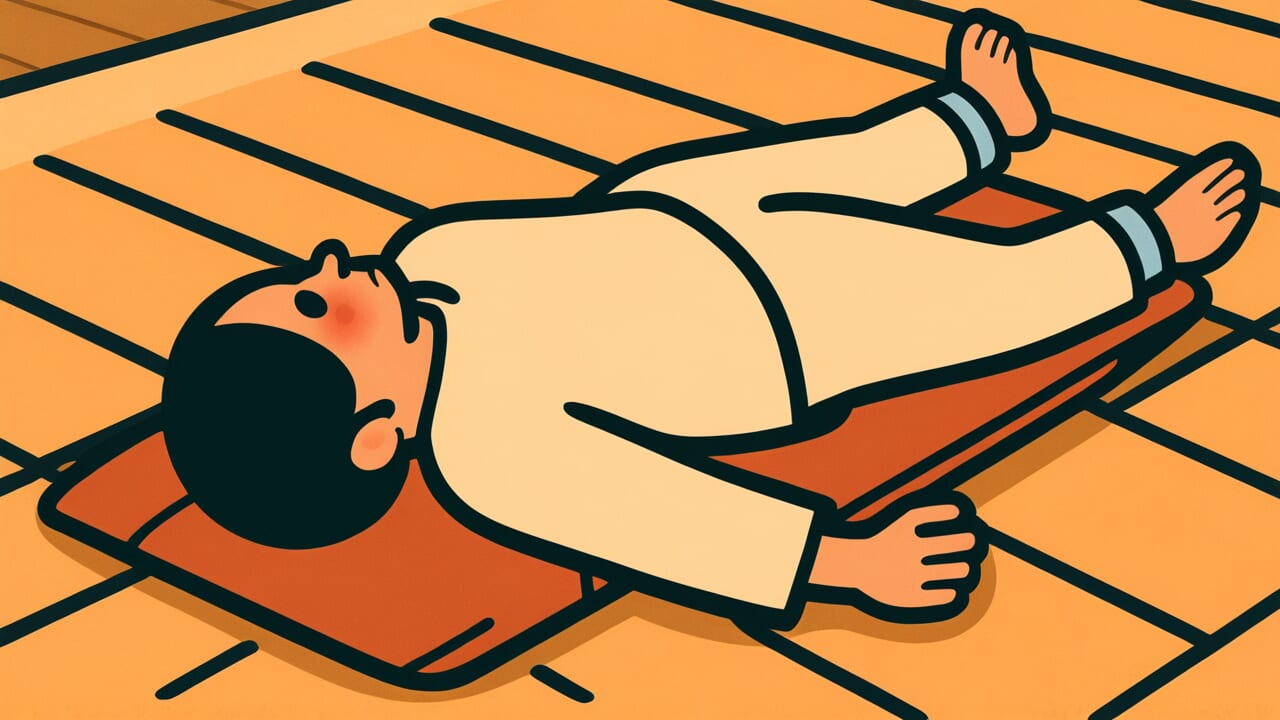How to Read “An injury on the tatami”
Tatami no ue no kega
Meaning of “An injury on the tatami”
“An injury on the tatami” means that unexpected accidents can happen even in places we consider safe if we let our guard down.
Tatami is soft and represents the safest place in a traditional Japanese home. Yet even in such a place, injuries can occur.
This teaches us that we should never be careless, no matter where we are.
This proverb points out a human tendency. People stay alert in dangerous or unfamiliar places.
But in everyday safe environments, they relax and become careless.
People use this saying to warn someone who is being careless because they feel safe. It’s also used to explain the danger of complacency when accidents happen in unexpected places.
Even today, situations that match “An injury on the tatami” are common. Falls at home and careless injuries at familiar workplaces are perfect examples.
This proverb teaches us a paradoxical truth. Safe environments can become the biggest traps precisely because we feel secure.
Origin and Etymology
The exact first appearance of this proverb in literature is unclear. However, we can make interesting observations about how the phrase is constructed.
The choice of “on the tatami” relates to the special role tatami played in Japanese living spaces.
Tatami was the symbol of the safest and most secure place in a Japanese home. It’s soft and cushions the impact if you fall.
It represents the indoor space protected from outside dangers. In the samurai era, battlefields and outdoors were dangerous places.
Indoor spaces with tatami were places where people could escape the threat of death.
Yet this proverb deliberately states that injuries happen in “the safest place of all.” This contrast is the heart of the saying.
People don’t neglect caution in dangerous places. But they become careless in places they believe are safe.
The proverb expresses this human psychology using the concrete image of “on the tatami.”
In reality, home accidents are statistically quite common. Our ancestors knew this from experience.
They created this proverb as a teaching to warn against carelessness in safe places.
Usage Examples
- Breaking a bone by tripping in the hallway you walk through every day is truly an injury on the tatami
- Veterans especially need to watch out for an injury on the tatami, because familiarity is the most dangerous thing
Universal Wisdom
“An injury on the tatami” offers deep insight into the dangerous relationship between human attention and feelings of security.
Why do people have accidents in safe places? It’s because the human brain tries to allocate limited attention resources efficiently.
In places we perceive as dangerous, our nerves sharpen. Adrenaline flows, our senses become acute, and we focus on each movement.
This is a completely natural response built into our survival instinct.
But in environments we judge as safe, the brain switches to energy-saving mode. Conscious attention turns to other things.
Body movements become automatic. This switching is both the intelligence and the weakness of humans as a species.
This proverb has been passed down through generations because this fundamental human trait never changes across time.
Ancient people and modern people alike become careless when they feel secure. Carelessness leads to accidents.
As technology advances and living environments become safer, the trap of complacency becomes more sophisticated.
Our ancestors understood that true safety comes not just from a safe environment. It also requires maintaining appropriate mental alertness.
This proverb teaches the importance of accepting that complete security doesn’t exist. It reminds us to live with humility.
When AI Hears This
The human brain has a strange characteristic. It unconsciously takes more risks in safe environments.
This is called risk homeostasis theory. Humans are creatures who try to maintain a certain level of risk.
Let’s look at concrete examples. When seatbelts became mandatory, drivers felt “protected.”
They unconsciously started driving faster. As a result, accident rates didn’t drop much.
The more safety devices increase, the bolder people become. The same thing happens at home.
Precisely because it’s a familiar place, people run down stairs or dash through slippery hallways in socks.
Actual statistics are surprising. In Japan, about 3,000 people die in traffic accidents each year.
But about 14,000 people die from home accidents. The home is more than four times more dangerous.
Falls and tumbles are especially common. They happen not just to elderly people but to young people too.
The essence of this phenomenon is that “the perception of safety turns off the defense system of attention.”
The assumption that it’s okay because you’re on tatami, or safe because you’re home, disables the brain’s alert mode.
Ironically, the place that should be safest transforms into a danger zone through psychological complacency.
Lessons for Today
This proverb teaches modern people to recognize the blind spots created by familiarity and security.
Think back on your daily life. The stairs you climb every day, the tools you’re used to, your usual work procedures.
Do you truly recognize the risks hidden there?
Modern society has become safer than ever before. But this has also dulled our sense of danger.
Research shows that as car safety features improve, driver attention decreases. This is the modern version of “An injury on the tatami.”
The important thing is not to worry excessively. Constant tension exhausts the mind.
Instead, be just slightly more conscious when you’re in safe environments. Hold gratitude that you’re getting through each day safely.
This naturally helps maintain appropriate attention.
Having a place where you feel secure is one of life’s great blessings. To protect that blessing for a long time, don’t forget humility and moderate alertness.
This proverb gently teaches us this sense of balance.



Comments